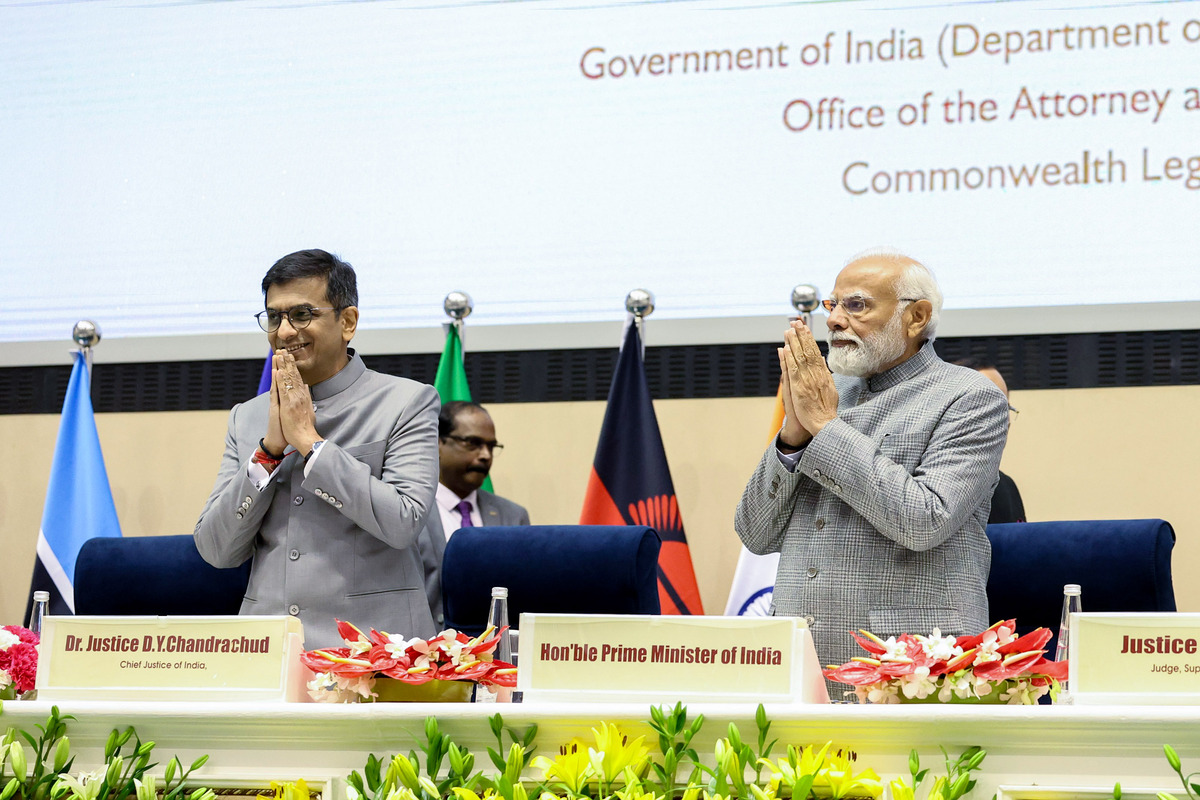DMK holds protest against Centre for “neglecting” Tamil Nadu in Union Budget
Dravida Munnetra Kazhagam (DMK) on Saturday held protests across Tamil Nadu against the Centre, alleging that the state was neglected in the Union Budget 2024.
He was inaugurating the Commonwealth Attorneys and Solicitors General Conference (CASGC) 2024 of the Commonwealth Legal Education Association (CLEA) on “Cross-Border Challenges in Justice Delivery.”

New Delhi, Feb 03 (ANI): Prime Minister Narendra Modi attends the inaugural event of the Commonwealth Legal Education Association (CLEA) - Commonwealth Attorneys and Solicitors General Conference (CASGC) 2024, in New Delhi on Saturday. Chief Justice of India (CJI) Justice DY Chandrachud also present at the event. (ANI Photo)
Prime Minister Narendra Modi on Saturday said the world needs to expand cooperation in criminal investigations and justice delivery, and when it happens, national jurisdictions will not delay justice, but become a tool to deliver it.
He was inaugurating the Commonwealth Attorneys and Solicitors General Conference (CASGC) 2024 of the Commonwealth Legal Education Association (CLEA) on “Cross-Border Challenges in Justice Delivery.”
Mr Modi said the nature and scope of crime has seen a radical change in recent times. Criminals have wide networks across various countries and regions. They use latest technology for both funding and operations. Economic crimes in one region are being used to fund activities in other regions.
Advertisement
The rise of crypto-currency and cyber threats is posing new challenges, he said. Twenty-first century challenges cannot be fought with a 20th-century approach. There is a need to rethink, re-imagine and reform, the Prime Minister told distinguished legal luminaries from across the world.
He said legal systems need to be modernised to deliver justice. “This includes making our systems more flexible and adaptable,” he said.
Sometimes, ensuring justice in one country requires working with other countries, Mr Modi said. Cooperation can happen even while respecting each other’s jurisdiction, he said.
“When we collaborate, we can understand each other’s systems better. Greater understanding brings greater synergy. Synergy boosts better and faster justice delivery,” the Prime Minister said.
Justice has great importance in Indian thought, he said. Ancient Indian thinkers said justice is at the root of independent self-governance. Without justice, even the existence of a nation is not possible, the Prime Minister said.
“When we speak of reforms, there needs to be a focus on making justice systems more citizen-centric,” he said. Ease of Justice is a pillar of justice delivery. In this space, India has many lessons to share.
In 2014, people of India blessed him with the responsibility of the Prime Minister, he said. Before that, he worked as the Chief Minister in Gujarat. “Back then, we decided to set up evening courts. This helped people attend court hearings after their work hours. This gave justice but also saved time and money. Hundreds of thousands of people benefited from this,” he said.
India also has a unique concept of Lok Adalat, the Prime Minister said. It means People’s Court, he said. These courts provide a mechanism for settlement of small cases related to public utility services. This is a pre-litigation process. Such courts have resolved thousands of cases and ensured easy justice delivery.
Legal education is a key instrument in boosting justice delivery. Education is where both passion and professional competence are introduced to young minds, he said. Worldwide, there is a discussion on how to bring more women into every domain. When the number of women in law schools increases, the number of women in the legal profession will also increase.
The world needs young legal minds with diverse exposure. Legal education also needs to adapt to changing times and technologies. A focus on understanding the latest trends in crimes, investigation and evidence will be helpful, he said.
There is a need to help young legal professionals with greater international exposure. “Our finest law universities can strengthen exchange programmes between countries,” he said.
India inherited a legal system from colonial times. But in the last few years, India has done away with thousands of obsolete laws from colonial times. Three new legislations have replaced more than 100-year-old colonial criminal laws, he said.
Earlier, the focus was on punishment and penal aspects. Now, the focus is on ensuring justice. Therefore, citizens have a sense of assurance rather than fear, he said.
Chief Justice of India Dr Justice D Y Chandrachud, Union Minister for Law and Justice Arjun Ram Meghwal, Judge of Supreme Court of India Justice Surya Kant, Attorney General for India Dr R Venkataramani, Solicitor General of India Tushar Mehta and President of Commonwealth Legal Education Association Prof Dr S Sivakumar were present on the occasion.
Advertisement